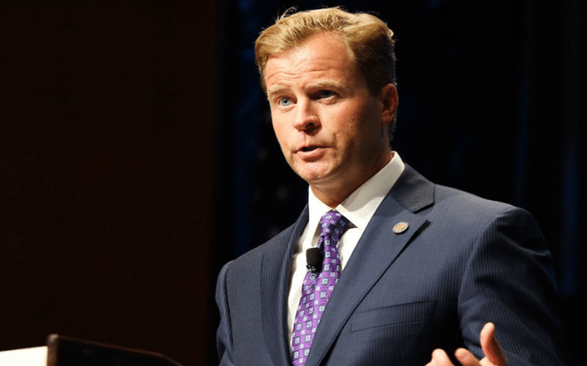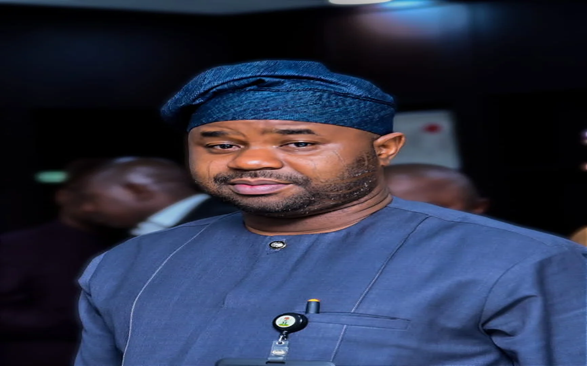by Jude Ayua
United States President-elect Donald Trump is considering Brian Quintenz to lead the US Commodity Futures Trading Commission (CFTC). Quintenz emerged as a top contender after he interviewed for the position, Bloomberg reported based on an exclusive interview with undisclosed sources.
Quintenz is a former Republican CFTC commissioner (2017–2021). Before the CFTC, he was Founder and leader of a hedge fund, Saeculum Capital Management. He currently leads policy at a16z Crypto, the digital asset arm of Andreessen Horowitz. Quintenz is one of the vocal voices on cryptocurrency in the US. According to Bloomberg, he is expected to “bridge the worlds of digital assets and traditional finance, if selected for the position.”
Read also: Paul Atkins to Succeed Gensler as US SEC Chair.
During Quintenz’s time at the CFTC, he led the Technology Advisory Committee. He was also instrumental to the launch of the first regulated Bitcoin and Ethereum futures contracts in the US. An advocate for balanced regulatory frameworks, he promoted financial innovation through discussions on decentralized finance and tokenized commodities. Critical of the Securities and Exchange Commission (SEC)’s stringent cryptocurrency regulations, Quintenz has advocated tailored policies for blockchain.
At Andreessen Horowitz, Quintenz has supported major blockchain projects like Coinbase, Solana, and Maker while spearheading efforts to create a more crypto-friendly regulatory environment. Andreessen Horowitz is one of the crypto organizations that supported crypto-friendly candidates in the 2024 US elections. In May, Bloomberg reported that it donated $25 million to the political action committee Fairshake for this purpose.
In a a16z crypto blog Quintenz co-authored with other Andreessen executives on 10 November, they noted their expectations of the future of crypto under Trump: “While we’ll likely have greater flexibility to experiment, we can’t forget that the fundamental regulatory principles applicable to blockchain systems remain unchanged.”
They also noted the possible expectations from the industry: “There will still be valid scrutiny from regulators and policymakers of certain aspects of the industry irrespective of progress on new legislation or a re-calibrated regulatory environment.”
Read also: Gary Gensler: The Imminent Resignation of the US SEC Chair and His Legacy.
CFTC preferred to SEC
There is a high preference of the CFTC within the digital asset industry as the regulatory body for crypto exchanges and related firms in the US. Industry players are constantly seeking clear guidance from Congress and regulators on the classification of their products or services; whether they fall under the CFTC’s or the SEC’s jurisdiction and how to comply with applicable rules.
The Trump administration’s reported interest in appointing Quintenz CFTC chair reflects a broader effort to enhance the CFTC’s role and potentially diminish the SEC’s influence in cryptocurrency regulation. A successful shift of the influence to the CFTC could help resolve jurisdictional disputes between the two agencies, particularly regarding the classification of digital assets. For example, with respect to Ether, Quintenz highlighted the SEC’s approval of Ether futures exchange-traded funds as evidence that it falls outside the SEC’s jurisdiction, affirming the CFTC’s position in regulating such assets.
The choice of the next CFTC chair comes at a critical time as the agency potentially assumes a broader role in cryptocurrency regulation. Trump’s favorable view of cryptocurrency, coupled with reports that several members of his administration hold digital assets, shows an alignment of policy direction and personal motivation.
Other potential candidates for the role of CFTC chair include commissioners Summer Mersinger and Caroline Pham, and legal experts like Joshua Sterling and Neal Kumar. However, Quintenz’s extensive expertise in managing both traditional and evolving financial markets, combined with his commitment to advancing blockchain innovation and his emphasis on clear regulatory frameworks make him a standout as a strong contender.
Read Also: Nigeria’s Investment and Securities Bill classifies virtual assets as securities.
Jude Ayua is a policy analyst at CAB. A lawyer, Jude is an associate at Infusion Lawyers where he is a member of the Blockchain & Virtual Assets Group. He is also a member of the Policy & Regulations Committee of the Stakeholders in Blockchain Technology Association of Nigeria (SiBAN). Jude reports and writes on crypto policy and regulations. jude@infusionlawyers.com
Discover more from Crypto Asset Buyer
Subscribe to get the latest posts sent to your email.





